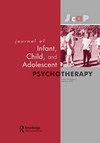“I Try to Think Behind My Child’s Cry”: Preparation for Separation Experiences in the Light of Parental Mentalization
Q3 Psychology
Journal of Infant, Child, and Adolescent Psychotherapy
Pub Date : 2023-07-03
DOI:10.1080/15289168.2023.2240004
引用次数: 0
Abstract
ABSTRACT The study focused on expanding the understanding of how parental mentalization (PM) occurs in an ecologically valid context during a toddler’s first transition phase from home care to early childhood education and care (ECEC). Little attention has been paid to understanding how PM occurs during a potentially stressful period of life when preparing for the first experiences of separation between the parent and the toddler. The aim of this phenomenographic study was to distinguish the qualitatively different ways parents (n = 21) experience, conceptualize, perceive, and understand the forthcoming first separation from their toddler (at 10–24 months). The results are presented in the outcome space on the basis of the phenomenographic analysis, which consisted of three categories of description: the parent’s own experiences and orientation for the forthcoming separation phase, the parent’s representation of the child’s forthcoming experiences, and PM indicators. These categories contained 10 subcategories and 480 meaning units. The mentalization indicators provide a broad view of PM in the transition phase, which consists of tolerable and reflective uncertainty. This is where some core functions of PM may be observed, maintaining flexibility toward the reactions of parents themselves and their toddlers.“我试着思考孩子哭泣的背后”:从父母心理化的角度为分离经历做准备
本研究的重点是扩大对父母心理化(PM)在幼儿从家庭护理到幼儿教育和护理(ECEC)的第一个过渡阶段如何在生态有效的背景下发生的理解。很少有人注意到,在准备父母和孩子第一次分离的时候,在一个潜在的压力时期,PM是如何发生的。本现象研究的目的是区分父母(n = 21)体验、概念化、感知和理解即将到来的与幼儿(10-24个月)的第一次分离的定性不同方式。结果是在现象分析的基础上呈现在结果空间中,其中包括三类描述:父母自己的经历和即将到来的分离阶段的方向,父母对孩子即将到来的经历的代表,以及PM指标。这些范畴包含10个子范畴和480个意义单位。心智化指标提供了过渡阶段的项目管理的广泛视图,其中包括可容忍的和反思的不确定性。这就是PM的一些核心功能可以被观察到的地方,对父母自己和孩子的反应保持灵活性。
本文章由计算机程序翻译,如有差异,请以英文原文为准。
求助全文
约1分钟内获得全文
求助全文
来源期刊

Journal of Infant, Child, and Adolescent Psychotherapy
Psychology-Clinical Psychology
CiteScore
1.70
自引率
0.00%
发文量
37
 求助内容:
求助内容: 应助结果提醒方式:
应助结果提醒方式:


